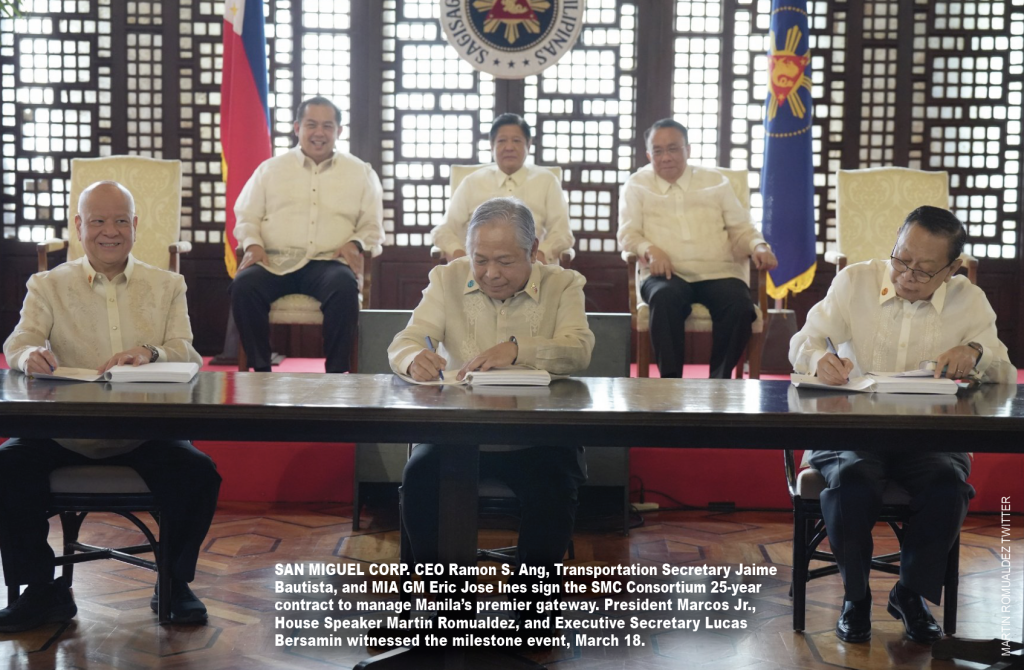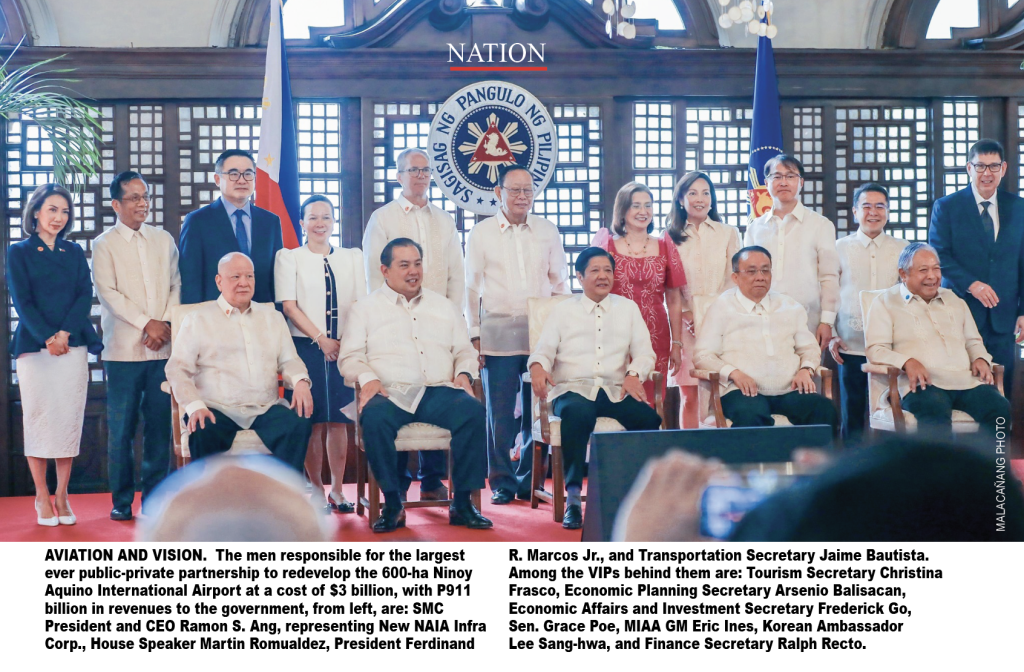“AN INVESTMENT IN OUR FUTURE,” SAYS MARCOS JR.
“This (NAIA Management) undertaking is not just about revenues that will be remitted to treasury alone, but resources invested in the airport and in many ways, it is an investment in our future.”
PBBM

It is the largest ever public-private partnership modernization project. It is an investment in our future.
That is how President Ferdinand “Bongbong” R. Marcos Jr. lauded the takeover by the San Miguel Corp. consortium of the management and operation of the Ninoy Aquino International Airport with the signing Monday, March 18, of the P170.6-billion public-private partnership (PPP) NAIA modernization and rehabilitation.
NAIA is also the fastest privatization auction ever conducted by the government, a testament to the Marcos administration’s keen focus on infrastructure to bolster economic growth.
P9 trillion in infra
The Marcos administration has lined up 185 major priority infrastructure projects to be completed and or jump-started between now and 2028.
The projects have an aggregate cost of P9 trillion or $163.6 billion.
“This (NAIA) undertaking is not just about revenues that will be remitted to treasury alone, but resources invested in the airport and in many ways, it is an investment in our future,’’ Marcos said after witnessing the signing ceremony in Malacañang for the largest solicited PPP project under his administration.
The agreement, signed by Department of Transportation (DOTr) Secretary Jaime Bautista, Manila International Airport Authority General Manager Eric Ines, and San Miguel Corporation (SMC) President and Chief Executive Officer Ramon Ang, initially covers 15 years and could be extended by 10 years.
Aside from the President, present at the signing were Speaker Martin G. Romualdez, Executive Secretary Lucas Bersamin, and Sen. Grace Poe, chair of the Senate Committee on Public Services.
62 million passengers a year
The President gushed that the modernization of NAIA will not only lead to additional revenue for the government but will also provide convenience to passengers by increasing the facility’s current passenger capacity from 35 million a year to 62 million annually.
Marcos also called on the consortium to “fulfill its commitment to this PPP project.”
Speaker Romualdez reiterated the government’s dedication to fostering an environment conducive to private sector investment and collaboration, emphasizing the pivotal role of PPPs in driving infrastructure development across the country.
The SMC consortium is composed of San Miguel Holdings Corp., RMM Asian Logistics, Inc., RLW Aviation Development, Inc., and Incheon International Airport Corp.

SMC promises to give P911 billion in 25 years
The diversified conglomerate, the country’s largest in revenues, won the contract to rehabilitate, operate, and maintain the country’s main gateway by offering the biggest revenue share of 82.16% to the government, equivalent to P911 billion in 25 years.
DOTr says once the NAIA modernization is complete, NAIA’s runway capacity will increase to at least 48 air traffic movements per hour.
NAIA under SMC will earn for the government P900 billion, or about P36 billion annually over a 25-year concession period.
Much-needed improvement
Meanwhile, the Manila International Airport Authority (MIAA) said that privatizing the country’s main gateway is indeed vital for its much-needed improvement.
NAIA is home to four passenger terminals and two intersecting runways that serve 40 international airlines, 9 domestic airlines, and 7 cargo companies.
Despite these remarkable achievements, NAIA still faces a range of challenges from dated infrastructure, passenger undercapacity, and a host of pressing issues affecting operational efficiency.
The project plan consists of four terminals, the general aviation area, and other structures and lands within the perimeter of the airport complex.
“It’s privatization is welcome, as there are many things that need to be improved — old buildings, terminals, taxiways, runways, equipment. I thank President Ferdinand Marcos Jr. for prioritizing this project,” MIAA Acting General Manager Eric Jose Ines told the Philippine News Agency in an interview.
Ines said fixing the NAIA requires massive budget, which the MIAA doesn’t have. “Our budget is not enough since we remit to the National Treasury a certain percentage of our revenue,” he explained.
Rate increases studied
Ines said the rates for all NAIA concessionaires would increase, but are still being finalized.
“We have informed our concessionaires about it last January. We consulted the ADB (Asian Development Bank) regarding this,” he said, adding that the increase in rates is not immediate.
Ines also admitted some things are yet to be discussed with the SMC-led group including the decision if an airline wants to introduce a flight via NAIA.
Earlier, Ines said that MIAA is in charge of the pest control and janitorial firm’s contracts, but there are no talks yet regarding the process if the new operator would want to add or prefer different firms, for instance.
Economic benefits
Speaker Martin Romualdez said the signing of the landmark PPP agreement “demonstrates the unwavering commitment of the administration of President Marcos to fostering sustainable growth and innovation in our transportation infrastructure.”
The speaker underscored the potential of the PPP project to elevate NAIA to world-class standards, enhancing its competitiveness and positioning it as a premier gateway to the Philippines.
“The revitalization of NAIA also promises broader economic benefits for our country and our people, including job creation, increased tourism, and greater connectivity with global markets,” Romualdez said.
PPP pivotal role
Romualdez reiterated the government’s dedication to fostering an environment conducive to private sector investment and collaboration, emphasizing the pivotal role of PPPs in driving infrastructure development across the country.
He also vowed the support of the House to ensure the successful implementation of the transformative project.
“We remain committed to working closely with all stakeholders to overcome challenges, uphold transparency, and deliver tangible benefits to the Filipino people,” the speaker said.
A step in the right direction
Senator Grace Poe lauded the signing of the concession agreement, calling it a “step in the right direction.”
Poe, chair of the Committee on Public Services, said the pact serves as a signal to the international community that the Philippines is ramping up its infrastructure development to welcome investments.
“As our gateway to the rest of the world, nothing showcases the potential of our country better than a well-maintained and operated international airport,” Poe said in a statement.
“We are very hopeful that a reputable company like San Miguel in partnership with industry leaders from Korea will deliver the world-class airport our people deserve,” she said.
Speaker cites govt-private sector tie-up
Speaker Romualdez commended the collaborative efforts between the administration and private sector stakeholders in advancing the vital project meant to bring about substantial improvements in airport facilities and services.
“The rehabilitation and operation of NAIA under this PPP framework demonstrate the unwavering commitment of the administration of President Marcos, Jr. to fostering sustainable growth and innovation in our transportation infrastructure,” said the leader of the 300-plus strong House of Representatives.
“This momentous occasion signals a new era of progress and efficiency for NAIA,” he added.
PPP to cure bottlenecks
The Speaker emphasized the importance of the PPP project in addressing longstanding challenges and bottlenecks that have hampered the airport’s capacity to meet the increasing demands of domestic and international travelers.
Environment good for business
SMC-SAP & Co. Consortium, composed of San Miguel Holdings Corp., RMM Asian Logistics, Inc., RLW Aviation Development, Inc., and Incheon International Airport Corp bagged the P170.6 billion PPP project by offering the biggest revenue share of 82.16% to the government.
As the winner, the SMC-led group is expected to improve the NAIA complex, including facilities such as the runway, taxiway, ramp areas and firefighting facility.
It is also expected to increase the airport’s current annual passenger capacity from 32 million to 62 million.
According to the Manila International Airport Authority, the turnover to the new operator will be by the second half of 2024.
The private operator’s contract initially covers 15 years and could be extended by 10 years.
MIAA will govern the private operator, set the standards and monitor the key performances and service levels of the private proponent.
The PPP deal is projected to generate around P900 billion in revenues for the national government in the course of a 15-year concession period, with a provision for an extension of another 10 years.
